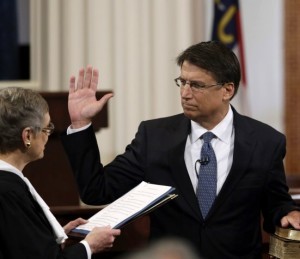What does the #BoycottIndiana RFRA “outrage” mean for North Carolina?

In my latest at IJReview, I noted NC’s GOP Governor Pat McCrory has signaled he doesn’t think such laws are necessary for this state. In fact, he indicated Monday he would veto in its current form a bill currently under consideration in the GOP-led state legislature that would give magistrates the option to opt out of performing a gay wedding ceremony if they feel it violates their religious faith.
“What is the problem they’re trying to solve?” McCrory asked during Monday’s broadcast of WFAE’s Charlotte Talks program.
North Carolina’s proposed version of the RFRA was introduced last week in both the state House and Senate. House Speaker Tim Moore said Tuesday that the bill deserved careful consideration in terms of how passage could impact NC’s “brand”:
RALEIGH – As opposition to a new Religious Freedom Restoration Act appeared to grow, N.C. House Speaker Tim Moore Tuesday signaled that lawmakers will take a hard look at its potential fallout.
Moore called an unusual, impromptu news conference in his office to say the House will be deliberate as it considers the bill.
He said while the bill is important to a number of House Republicans, the session’s primary goals are job creation and improving roads and education. He said he wants to find out how the religious freedom legislation accomplishes those objectives and what it does to improve North Carolina’s “brand.”
“I think we need to show that if we approve this bill, that it will improve North Carolina’s brand,” he said. “Anything we do, we have to make sure we don’t harm our brand.”
[…]
Moore alluded to the current backlash in Indiana after GOP Gov. Mike Pence signed a similar bill into law.
Major industries, including Eli Lilly and Co., have urged Indiana officials to change the law so it can’t be used to justify discrimination. The head of the NCAA, scheduled to hold its Final Four this weekend in Indianapolis, said the law “strikes at the core values of what higher education in America is all about.”
Moore noted that Indiana is feeling repercussions from passage of its religious freedom law. He’s met with business leaders, and North Carolina’s bill has come up.
Another Republican in the House, Rep. Charles Jeter (R-Huntersville) gave off the distinct impression that he wouldn’t support such legislation:
GOP Rep. Charles Jeter of Huntersville said the N.C. proposal differs from the federal law in another respect.
“The difference is how it’s intended to be applied,” Jeter said. “And while some people may not like it, society grows over time. I think this (proposal) is specific to the homosexual issues, the same-sex issues, the gender issues.”
Jeter said existing laws already protect religious freedom.
Senate President Pro Tem Phil Berger (R) doesn’t sound too enthused about the issue, either:
So, would the North Carolina’s Religious Freedom Restoration Act measures, which have been filed in both the House and the Senate, contribute to that economic boom?
“I think what we’ve done over the past four years would be the thing that has put us in a position where our economy is performing most other states,” said Berger, R-Rockingham. “I think what we are going to be focused on, as we have been over the past four years, is doing things that will move us in that direction. That means we’re going to deal with economic development, continuing tax reform, our regulatory climate, all of those kinds of things.”
So, it doesn’t sound like the RFRA is part of that group, does it?
“It’s been filed. A decision will be made as to whether or not we move it forward,” Berger said.
Everything at this point that happens with this type of legislation here in North Carolina needs to be viewed through the post-passage-of-the-Indiana-law prism. As I wrote on Twitter last night:
#NCGA GOP leaders signalling a hesitation on an NCRFRA -no doubt being held economic hostage is a factor-> http://t.co/v2XNGrO9dP … #NCPOL
— Sister Toldjah (@sistertoldjah) March 31, 2015
NC is in the midst of an economic recovery, & the vibe I get is #NCGA leaders don't want to risk an economic boycott over RFRA here. #NCPOL
— Sister Toldjah (@sistertoldjah) March 31, 2015
American Airlines says it will "fight" against RFRA-style laws here. Charlotte Chamber unhappy, too. http://t.co/UDUfE3RQck #ncga #ncpol
— Sister Toldjah (@sistertoldjah) March 31, 2015
What's your opinion on an RFRA law in NC? Let your #NCGA reps know –> House http://t.co/YBdhLFoMeZ Senate http://t.co/Ag8TpNEX9g #NCPOL
— Sister Toldjah (@sistertoldjah) March 31, 2015
Simply put, GOP leaders in North Carolina are are already giving off vibes that they no longer want to deal with the hassle of trying to defend themselves and their state in front of a national audience as they’ve had to do over the last couple of years, thanks to the left’s relentless targeting and bullying of their reform agenda, this time over a law that some of them clearly fear could have a negative impact on our still-recovering local economy if the boycotts threats begin.
Color me a bit disappointed so far by what I’m hearing. BUT, as they say, stay tuned….
